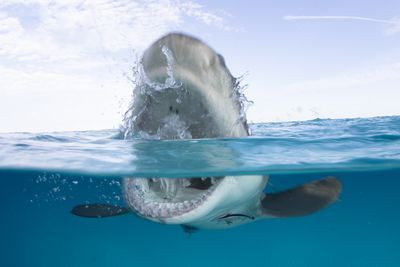Man On Deep-Sea Fishing Trip Sustains Severe Injuries In Attack By 3-Metre-Long Shark
KEY POINTS
- The injured man had to travel overnight in a boat to receive medical treatment
- He said the shark was at least three meters long
- The victim sustained serious injuries to his lower body
A man has sustained severe leg injuries after being attacked by a shark during a deep-sea fishing trip in Western Australia.
The man in his 30s was reportedly attacked by the shark at around 8:30 p.m. Tuesday near the remote Varanus Island off the Pilbara coast. The fishing charter group provided the injured man primary aid on their vessel. He was then transported overnight to the Exmouth boat ramp, where St. John WA ambulance crew and fisheries officers were waiting to take him to the hospital, reported The Sydney Morning Herald.
A spokesperson for the St. John Ambulance said the man sustained significant injuries to his lower body, but they are not life-threatening, reported ABC Australia. The man was taken to Exmouth Hospital for treatment just after 10:30 a.m., reported the Herald.
The Royal Flying Doctor service is due to fly the man to Perth, where he is expected to receive further treatment at the Royal Perth Hospital.
According to the victim, the shark that he described as a “big one” was at least longer than three meters. The Department of Primary Industries and Regional Development believes that the animal was a Sicklefin lemon shark. Their fisheries division is said to be investigating the incident.
Found in Australian waters, Lemon Sharks can grow up to 3.8 meters in length, states ABC Australia. They can be found in waters less than 92 meters deep.
The Taronga Conservative Society (TCS) in Australia has indexed 15 shark attack cases so far in 2021, of which one attack led to the victim's death. The TCS states humans are not a part of sharks' natural diet. Sharks would have to eat thousands of people each year to have humans considered a part of their diet, which is not the case, the society believes.
According to America's National Oceanic and Atmospheric Administration (NOAA), sharks attack humans when they are curious or confused. The agency also emphasizes that sharks are not dangerous to humans. If a shark sees a human in the water, then it might try to investigate their presence. This could cause an accidental attack.
Last month, a 25-year-old surfer sustained a 20-centimeter laceration on his leg after an unknown species of shark bit his ankle and calf during a surfing outing in western Australia.






















